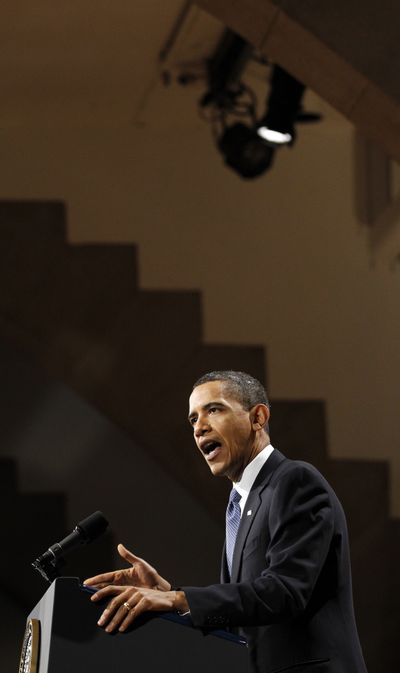Senate primes for reform
Obama asks Wall Street to join as lawmakers negotiatiate deal

WASHINGTON – Senate Democratic leaders on Thursday set next Monday for a key vote on financial regulatory reform legislation, setting off frantic negotiations to complete a bipartisan deal as President Barack Obama urged Wall Street “to join us, instead of fighting us.”
The effort to reach a compromise on the landmark bill, which is expected to stretch through the weekend, is more than a test of Obama’s ability to achieve his major goals. It also tests Congress’ ability to arrest the current epidemic of partisanship and respond to a fevered wave of public anger over Wall Street’s role in triggering the worst financial crisis since the Great Depression.
Obama struck a conciliatory tone in a speech given in the shadows of Wall Street, praising the importance of financial firms and free markets to the U.S. economy as he tried to close the sale on a nearly yearlong push for the most sweeping overhaul of financial rules since the 1930s.
But even as Obama held out an olive branch, he insisted that tighter regulations were needed to rein in risky practices that led to the financial crisis and the recession.
“It is essential that we learn from the lessons of this crisis, so we don’t doom ourselves to repeat it,” Obama said. “And make no mistake, that is exactly what will happen if we allow this moment to pass. And that’s an outcome that is unacceptable to me and it’s unacceptable to you, the American people.”
The groundwork for the Senate’s first vote on the issue was laid Thursday when Senate Majority Leader Harry Reid, D-Nev., asked to bring up the legislation. As expected, Republican Leader Mitch McConnell, R-Ky., objected, delaying action and giving negotiators more time to reach a compromise. Even if no deal is reached, Reid can circumvent McConnell’s objection with a 60-vote majority in Monday’s vote. That means he would need at least one Republican.
Sen. Charles E. Schumer, D-N.Y., said he found it hard to believe that Republicans would “all vote no, blocking financial reform.”
The landmark legislation would tighten financial regulations dramatically. It would create an agency to protect consumers in the financial marketplace; impose tough new regulations on complex financial derivatives; grant shareholders a nonbinding vote on executive compensation; and give the government authority to seize and dismantle large firms whose failure would pose a danger to the economy.